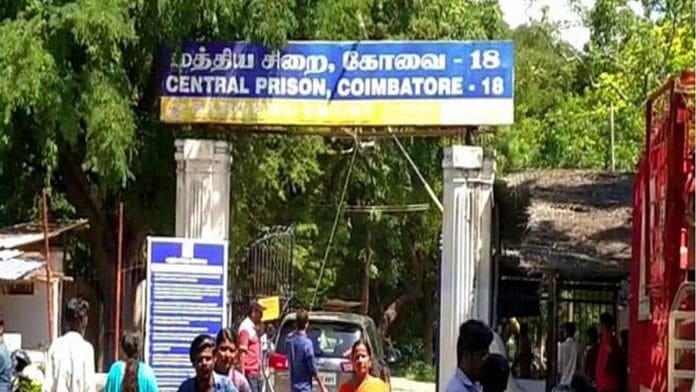New Delhi: The Supreme Court Tuesday directed the Tamil Nadu government to uphold the rights of prisoners with disabilities by providing them with adequate infrastructural facilities in jail, citing larger public interest concerns and the need to protect their dignity and healthcare rights in custody.
A bench of Justices J.B. Pardiwala and R. Mahadevan said that the government has a constitutional and moral obligation to uphold the rights of prisoners with disabilities.
The judgment came on a petition filed by a lawyer L. Muruganantham suffering from Becker Muscular Dystrophy, a progressively degenerative locomotive disability, and autism. He was assessed as having 70 percent disability in 2013, which was increased to 80 percent in 2020.
“This includes not only ensuring non-discriminatory treatment but also enabling their effective rehabilitation and reintegration into society,” the court said, while adding that reasonable accommodations are not optional but integral to any humane and just carceral system.
Calling for a “systemic transformation” grounded in compassion, accountability and constitutional equality, the court said, “The disabilities of incarcerated individuals must not become a basis for further deprivation or suffering; rather, the prison system must evolve to affirm their rights and provide the care necessary for rehabilitation.”
Also Read: The 7 criminal gangs of Delhi run from inside jail, use juveniles & apps such as Telegram
What was the case about?
The case stems from a 2020 complaint filed against the lawyer suffering from autism and Becker Muscular Dystrophy, who alleged that he and his mother were falsely accused by his uncle’s associates following a civil dispute.
Following the complaint, an FIR was registered against Muruganantham, he told the court, on charges related to public obscenity, voluntarily causing hurt and criminal intimidation, including threats to cause death.
Subsequently, the lawyer was arrested, harassed and allegedly tortured. When he appeared before the district court later, he contended that authorities at Central Prison, Coimbatore, failed to provide him proper food, medical treatment and care, as required under the Rights of Persons with Disabilities Act, 2016.
He added that the prison lacked the infrastructure and facilities necessary for prisoners with disabilities, and officials were allegedly insensitive and ill-informed regarding the rights of persons with disabilities.
Although he was released the same year, he filed a complaint with the State Human Rights Commission, seeking compensation worth Rs 50 lakh, for deprivation of his life and liberty during incarceration.
The Commission then recommended that the Tamil Nadu government pay Rs 1 lakh to Muruganantham and directed that all prisons in the state be made more accessible.
Challenging the Commission’s order, he approached the Madras High Court in 2022, which dismissed his petition.
Subsequently, he made his way to the top court. In his plea, he said he was denied essential support like physiotherapy, psychotherapy, protein-rich nutrition, accessible sanitation facilities, ramps and warm water for bathing, among other things.
What were the guidelines?
In its ruling, the court cited Articles 14 and 21 of the Constitution—which deal with the right to equality and life—as well as the RPwD Act, 2016, and India’s international obligations under the United Nations Convention on the Rights of Persons with Disabilities (UNCRPD). It proceeded to give guidelines for “immediate” compliance.
Firstly, the court directed all prison authorities to identify prisoners with disabilities at the time of admission promptly. “Each prisoner shall be given an opportunity to declare any disability and provide information about their specific needs,” it said.
Secondly, it said that all rules, regulations and essential information about prison life shall be provided to such prisoners in accessible and understandable formats such as Braille, large print, sign language or simplified language.
Third, it said that prison premises should be equipped with wheelchair-friendly spaces, accessible toilets, ramps and sensory-safe environments to ensure universal accessibility.
“All prisons shall designate and maintain dedicated spaces for physiotherapy, psychotherapy and other necessary therapeutic services,” the court also said.
The court also directed prison medical officers to be adequately trained and sensitised to address disabling conditions. “Furthermore, regular awareness and sensitisation programmes shall be conducted in all prisons,” it added.
Finally, the court also directed the government to maintain and update disaggregated data on the disability status of prisoners, including their records of accessibility, reasonable accommodations, and medical requirements.







Sanjay Dutt, after being released from jail, said he will work on jail reforms, but nothing happened. This petition will also do nothing.